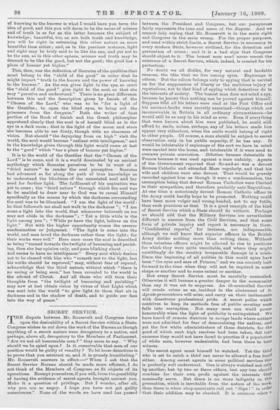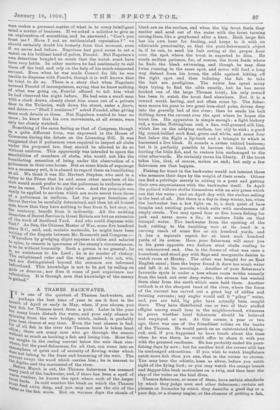SECRET SERVICE. between the President and Congress, but our paraphrase
fairly represents the tone and sense of the dispute. And we cannot help saying that Mr. Roosevelt is in the main right and Congress in the main wrong,- For the proper purposes, and used within strict limits, a Secret Service is necessary in every modern State, however civilised, for the detection and prevention of crime; and it is a bad sign that Congress should object to it. The honest man need never resent the existence of a Secret Service, which, indeed, is created for his protection.
No doubt we all dislike, for very natural and laudable reasons, the idea that we live among spies. Espionage is odious. But the odium belongs only to spying that is carried on for the suppression of liberty or the malicious injury of reputations, not to that kind of spying which detectives do in the interests of society. The honest man does not mind a spy, because he knows that nothing can be proved against himself. Suppose tat all his letters were read at the Post Office and his account-books were secretly examined—things which are inconceivable in Britain in all ordinary circumstances—he would still be as easy in his mind as ever. Even if everything that were known about him were published, he could still afford to smile, unless, perhaps, any of his letters made him appear very ridiculous, when the smile would belong of right to other people. Of course, a man should be subject to secret observation only in his public capacity, if he has any. It would be intolerable if espionage of the sort we have in mind were carried into the home, and intolerable if it were used to overawe private conviction. Deletion became detestable in France because it was used against a man unfairly. Agents of the Government reported that So-and-so was a devout Roman Catholic and attended Mass regularly, and that his wife and children were also devout. That would be gravely recorded against him as though it were a condemnation, the assumption being that devout Roman Catholics were Clerical in their sympathies, and therefore probably anti-Republican. At one time a notoriously devout Roman Catholic officer in the Army could hardly hope to be promoted. Nothing could have been more vulgar and wrong-headed, not to say futile, than suohpractices as that. It is a good example of the kind of Secret Service which a State should do without. Perhaps we should add that the Military Services are nevertheless different in essence from the Civil Services, and that some form of private inquiry and report is necessary in them. "Confidential reports," for instance, are indispensable, although we well know that superior officers in the British Army dislike nothing more than writing them. Without them valueless officers might be allowed to rise to positions for which they were quite unsuitable, and where they might unwittingly do the country irreparable damage in a crisis. Since the beginning of all polities in this world spies have been "the eyes and ears of Princes," and we can scarcely look forward to the time when they will not be required in some shape or another and to some extent or another.
But every Secret Service must be carefully controlled. Otherwise it will become a greater danger to the community than any it was set to suppress. An ill-controlled Service will create crime as an, incident in the abatement of it. Agents-provocateurs will arise, and carry on their incitements with disastrous professional pride. A secret police which contrives to keep its methods free of public scrutiny soon falls into corruption. Not many mon can wield power honourably when the light of publicity is extinguished. We have beard of remote districts in savage lauds where settlers were not admitted for fear of demoralising the natives, and yet the few white administrators of those districts, for the good of which such high resolves had been taken, fell into excesses they would not have dared to practise if a population of white men, however undesirable, had been there to bear witness.
The secret agent must himself be watched. Yet the thief who is set to catch a thief can never be allowed a free hand either. Among secret agents in some political services this is perfectly well understood. One is always watched not onlY by another, but by two or three others, lest any two shoula combine for their own profit against the interests thei nominally serve. But there is no more indignity in this precaution, which is inevitable from the nature of the works than there is when shop-assistants call out "Sign " in order that their addition may be checked. It is ominous when a man makes a personal matter of what is to every intelligent mind a matter of business. Uwe Asked a solicitor to give us an explanation of something, and he answered: "Can't you trust me ? Have I not an unblemished reputation P" we Should certainly doubt his honesty from that moment, even if we never had before. Napoleon had good cause to set a watch on his brilliant head of police, Fouebe. But Napoleon's own detectives bungled so much that the watch must have been very futile. In other matters he had continually to call
them off the trail and rely on the help of his much-suspected
servant. Even when he was made Consul for life lie was unable to dispense with Fouche, though it is well known that
he tried to do so. There is a story that when Napoleon
accused Fouche of incompetence, saying that he knew nothing Of what was going on, Fouche offered to tell him what he had observed the night before. He had seen a small man with a cloak drawn closely about him come out of a private door in the Tuileries, walk down the street, enter a fiaere, and drive—" Shall I continue ? " asked Fouche, after giving some such details as these. But Napoleon wanted to hear no more; he knew that his own movements, at all events, were only too closely watched. Something of the same feeling as that of Congress. though 14 a quite different form, was expressed in the House of Commons during the debate on the Licensing Bill. It was Suggested that if policemen were required to inspect all clubs
under the proposed law, they should be allowed to do so Without uniform. This apparently was intended to spare the sensibilities of members of clubs, who would not like the
humiliating sensation of being under the observation of a Policeman in their own house. But as some kinds of espionage are a necessary evil, it is absurd to regard them as humiliating at all. We think it was Sir Herbert Stephen who said in a letter to the Tknuts that he and some other members of his
Club would much prefer to see the policeman in uniform when-
ever he came. That is the right view. And the principle can easily be applied to services which are more secret than those
Of a policeman in uniform. Let the proper functions of
Secret Service be carefully determined, and then let all honest Men know that they have nothing to fear from it, but may, on Ale contrary, benefit from it indirectly. All the existing
branches of Secret Service in Great Britain are but an extension of the work of Scotland Yard. And who could dispense with
that p As Sun, the Chinese Master of War, some five hundred Years B.C., said, and, mutatia mutandis, he might have been writing of the dispute between Mr. Roosevelt and Congress :— t" Wherefore by grudging slight expense in titles and salaries .°°Pies, to remain in ignorance of the enemy's circumstances, to be without humanity. Such a person is no general; he to assistance to his Lord; he is no master of victory. .ube enlightened ruler and the wise general who act, win, lInd are distinguished beyond the common are informed eeforehand. This knowledge is not to be got by calling on !Ids or demons; nor does it come of past experience nor ',aloulation. It is through men that knowledge of the enemy ls gained."





































 Previous page
Previous page